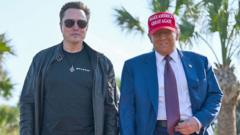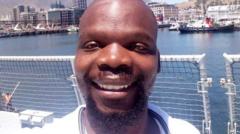### Summary: President Donald Trump's recent decision to freeze nearly $440 million in aid to South Africa has raised alarms about the nation’s diplomatic standing. Escalating tensions relate to land reform policies and ongoing international cases, leading to a precarious relationship with the U.S.
### Title: South Africa Faces Diplomatic Crisis Following Trump Aid Freeze

### Title: South Africa Faces Diplomatic Crisis Following Trump Aid Freeze
### Description: The freeze on U.S. aid has stirred concerns about South Africa's future trade relations and responses to ongoing land reforms and international law cases.
South Africa is navigating a turbulent period in its diplomatic relations with the United States following President Donald Trump's startling move to freeze nearly $440 million in aid. Trump's executive order targets the nation, accusing it of promoting "unjust" practices against the white Afrikaner minority and criticizing its recent land reform efforts.
The decision, which came after South African President Cyril Ramaphosa enacted the controversial Expropriation Bill allowing land confiscation without compensation in certain cases, has sent ripples of concern across the country. Experts fear this could lead to further repercussions, including the potential loss of preferential trade access under the Africa Growth and Opportunity Act (Agoa), which has been a critical component of South Africa's trade relationship with the U.S.
Since the end of apartheid and Nelson Mandela's presidency, South Africa has maintained generally positive relations with the U.S. However, tensions have escalated in recent years, particularly following Trump's comments about land reform and the accusations of discrimination against the Afrikaner community. In response to the aid freeze, the U.S. embassy clarified that funding tied to the Pepfar program for HIV/AIDS, crucial for nearly 5.5 million people receiving treatment, would remain unaffected.
During his tenure, Trump has repeatedly used South Africa as a platform to express his discontent with its leadership and policies. These criticisms resonate with conservative Afrikaner groups like AfriForum, which oppose "race-based laws." Amid these dynamics, tech billionaire Elon Musk has added fuel to the fire by questioning the government's stance on ownership laws, revealing a shared sentiment within sections of South African society.
Political analysts suggest that Trump's actions could mark a turning point in U.S.-South Africa relations, with long-term consequences for trade and diplomatic engagement. As South Africa’s Foreign Minister Ronald Lamola remains firm on the nation's stance in challenging Israel at the International Court of Justice, experts caution that the country's relationship with the U.S. might not recover easily.
Furthermore, with Ramaphosa at the helm of the G20 presidency, there are attempts to bolster South Africa's international standing and clarify its foreign policies. However, the recent snub by U.S. Secretary of State Marco Rubio signals fraught relations moving forward. Rubio emphasized the need for U.S. interests to take priority over fostering goodwill with nations perceived as hostile.
Looking ahead, navigating these complex relations may compel South Africa to consider alliances with countries such as those in the Brics coalition. Meanwhile, the European Union has reaffirmed its support despite the current diplomatic turmoil, positioning itself as a potential alternative trade partner.
As tensions rise, South Africa's government may need to think carefully about its strategies, potentially leveraging its mineral exports as a negotiating tool while managing the fallout from Trump's actions carefully. The coming months are set to define South Africa’s next moves in the intricate chess game of international diplomacy.






















